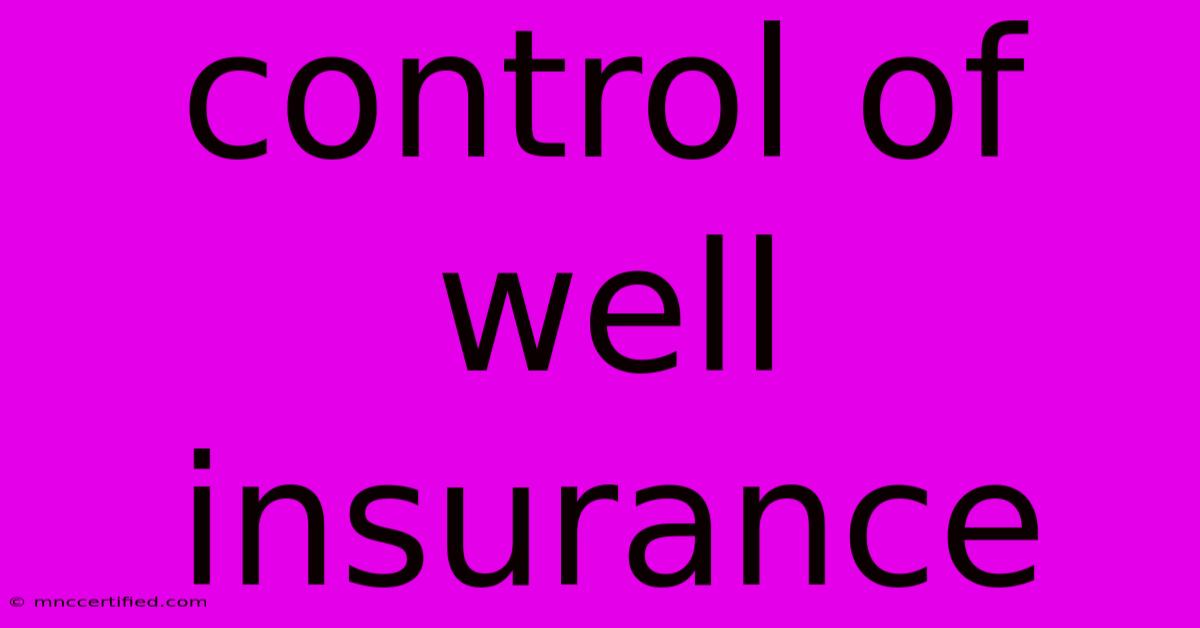Control Of Well Insurance

Table of Contents
Mastering the Control of Well Insurance: A Comprehensive Guide
Well insurance, often overlooked until a crisis hits, is crucial for protecting your significant investment in a private water well. Understanding the intricacies of well insurance and implementing effective control measures can safeguard your family and finances. This comprehensive guide delves into the critical aspects of well insurance, empowering you to take control and secure your water source.
Understanding Your Well Insurance Policy: Key Components
Before diving into control measures, it's paramount to understand your policy inside and out. Many homeowners mistakenly assume their homeowner's insurance covers well issues. This is often not the case. Well insurance is typically a separate policy, offering specific coverage for well-related problems.
Essential Coverage Areas:
- Well Repair/Replacement: This is the core of your well insurance. It covers the costs associated with repairing or replacing your well in case of failure due to covered causes (e.g., pump malfunction, casing collapse). Carefully review the definition of "failure" in your policy.
- Water Contamination: This coverage addresses issues related to water contamination, including testing, remediation, and cleanup. Understand what contaminants are covered and any exclusions.
- Well Development: Some policies include coverage for well development, which involves improving the well's efficiency and water yield.
- Legal Liability: In case of well-related incidents causing injury or property damage to others, liability coverage is crucial.
Identifying Policy Gaps:
Thoroughly review your policy document for any exclusions or limitations. Common exclusions can include:
- Pre-existing conditions: Problems that existed before the policy's effective date may not be covered.
- Neglect or lack of maintenance: Failure to properly maintain your well could void coverage.
- Acts of God: While some policies cover damage from natural disasters, others may exclude specific events.
Proactive Measures: Controlling Well Insurance Costs and Risks
While insurance mitigates risks, proactive measures significantly reduce the likelihood of claims and can even influence premium costs.
Regular Well Maintenance: The First Line of Defense
Preventive maintenance is paramount. Regular inspections and servicing by a qualified well professional can identify potential issues before they escalate into costly repairs.
- Annual Inspections: Schedule annual inspections to assess the well's overall condition, including pump functionality, casing integrity, and water quality.
- Pump Maintenance: Regularly check your pump for leaks, wear and tear, and proper operation. Consider a preventative maintenance contract with a well service company.
- Water Testing: Regular water testing is essential to identify potential contaminants before they impact your health. Test for bacteria, nitrates, and other potential pollutants.
- Proper Sanitation: Maintain a clean and clear area around your well to prevent contamination.
Choosing the Right Well Insurance Provider
Shopping around for well insurance is crucial. Compare quotes from multiple providers, paying close attention to coverage levels, exclusions, and premiums. Consider factors like:
- Reputation and Financial Stability: Choose a reputable insurer with a strong financial standing to ensure they can meet their obligations in case of a claim.
- Customer Service: A responsive and helpful customer service team is invaluable during stressful situations.
- Policy Flexibility: Look for policies that offer customizable coverage options to suit your specific needs and budget.
Reacting to a Well Problem: Navigating the Claims Process
Despite preventative measures, well problems can arise. Knowing how to navigate the claims process is critical.
Immediate Actions:
- Document the Damage: Take photos and videos of the damaged well. Note the date and time of the incident.
- Contact Your Insurance Provider: Notify your insurer promptly, following their specific reporting procedures.
- Avoid Further Damage: Take steps to minimize further damage to the well, but don't attempt major repairs yourself.
- Keep Records: Maintain detailed records of all communications, invoices, and other relevant documentation.
Working with Your Insurer:
- Cooperate Fully: Provide all necessary information and documentation to your insurer in a timely manner.
- Understand Your Policy: Refer to your policy document to understand your rights and responsibilities.
- Seek Clarification: Don't hesitate to ask questions if anything is unclear.
- Consider Legal Advice: If you have disputes with your insurer, consult a legal professional.
By understanding your policy, implementing preventative maintenance, and knowing how to handle claims, you can effectively control your well insurance and protect your most valuable resource: your clean and safe water supply. Remember, proactive management is key to minimizing risk and maximizing the benefits of your well insurance policy.

Thank you for visiting our website wich cover about Control Of Well Insurance. We hope the information provided has been useful to you. Feel free to contact us if you have any questions or need further assistance. See you next time and dont miss to bookmark.
Featured Posts
-
Bella Hadids Yellowstone Cameo Shocks Fans
Dec 10, 2024
-
Habba New Attorney For Trump
Dec 10, 2024
-
Carry Ons Julie Stevens Dies Aged 87
Dec 10, 2024
-
Trumps New Presidential Counselor Nj
Dec 10, 2024
-
Lara Trump Resigns Rnc Co Chair Role
Dec 10, 2024